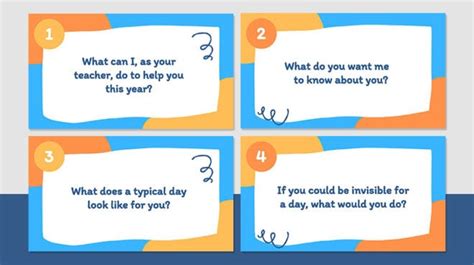As students, checking in on one another can be an essential element of fostering a supportive and inclusive learning environment. However, knowing how to ask meaningful questions that elicit genuine responses can be challenging. This article provides a comprehensive guide to help students craft effective check-in questions.

Understanding the Importance of Check-Ins
According to a survey by the National Association of School Psychologists, 70% of students feel more engaged and supported when they participate in regular check-ins. By asking meaningful questions, teachers and students can:
- Build relationships: Nurturing connections between students creates a sense of belonging and safety.
- Promote well-being: Checking in allows students to express their feelings and concerns, empowering them to seek support when needed.
- Identify challenges: Open and honest conversations can identify academic, social, or emotional difficulties faced by students, enabling timely intervention.
Crafting Effective Check-In Questions
1. Open-Ended Questions:
- “How are you feeling today?”
- “Is there anything on your mind you’d like to share?”
- “What would make this check-in more meaningful for you?”
2. Specific Questions:
- “Did you have any questions about yesterday’s lesson?”
- “Are you feeling prepared for the upcoming test?”
- “How are you managing your workload outside of class?”
3. Empathetic Questions:
- “I noticed you seemed a bit quieter than usual today. Is everything okay?”
- “You mentioned you were having some trouble with the assignment. How can I support you?”
- “I know the past few weeks have been stressful. How are you coping?”
4. Reflection Questions:
- “What worked well in our last check-in?”
- “Is there anything you’d like to see changed in our check-in routine?”
- “How can we make our check-ins more effective in the future?”
Tips and Tricks for Asking Check-In Questions
- Be present and attentive: Give students your undivided attention and demonstrate genuine interest in their responses.
- Maintain confidentiality: Respect students’ privacy and avoid gossiping or sharing their concerns with others.
- Use a variety of questions: Mix open-ended, specific, empathetic, and reflection questions to keep check-ins engaging and comprehensive.
- Offer support and encouragement: Use active listening and empathy to show students that you care about their well-being and that they are not alone.
- Involve students in the process: Ask students for feedback on check-in questions and invite them to suggest new topics.
Common Mistakes to Avoid
- Using closed-ended questions: Yes/no questions limit students’ responses and can discourage open dialogue.
- Being judgmental or dismissive: Evaluate students’ concerns objectively and avoid making negative or invalidating comments.
- Overwhelming students with questions: Keep check-ins brief and focused to avoid overwhelming students.
- Not following up: Once concerns are raised, follow up with students to ensure they are receiving the support they need.
- Ignoring cultural differences: Be aware of students’ cultural backgrounds and adapt questions accordingly to respect their values and customs.
Creative New Word: “Checklyst”
“Checklyst” is a portmanteau of “checklist” and “check-in.” It refers to a set of predetermined questions or topics that can guide check-ins and ensure that key areas are covered. This approach can streamline check-ins, promote consistency, and facilitate data collection.
Tables for Check-In Questions
| Question Type | Example |
|---|---|
| Open-Ended | How are you finding the current learning environment? |
| Specific | Are you having any difficulties with the math homework? |
| Empathetic | I noticed you seemed a bit stressed during the presentation. How are you feeling? |
| Reflection | What one thing could we do to improve our check-ins in the future? |
| Question Topic | Examples |
|---|---|
| Academic concerns | Assignment workload, understanding of concepts, test preparation |
| Social-emotional well-being | Stress levels, peer relationships, personal challenges |
| Class dynamics | Group work, communication, classroom culture |
| Growth and development | Goals, aspirations, areas for improvement |
| Checklyst Template | Example |
|---|---|
| How are you feeling today? (1-5 scale) | |
| Are there any specific academic or social concerns you’d like to discuss? | |
| Is there anything you need support with outside of school? | |
| How can I make our check-ins more meaningful for you? |
| Student Feedback | Response |
|---|---|
| I like that we have regular check-ins. It gives me a chance to talk about things that are on my mind. | Positive feedback |
| I would prefer if the check-ins were shorter. They can sometimes feel a bit overwhelming. | Constructive feedback |
| I wish the check-ins included more discussion of our academic progress. | Suggestion for improvement |
